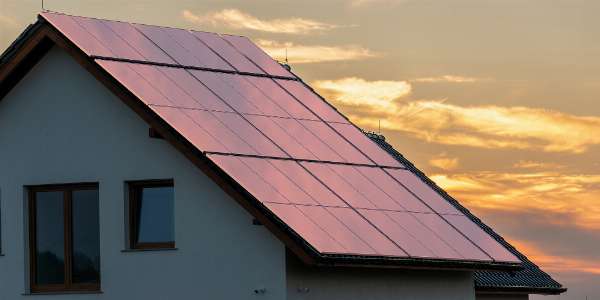Solar energy is still an evolving technology and a rapidly changing industry. That can make it hard to balance the upfront costs of solar against the energy savings and tax incentives.
In this article, we’ll help you decide whether now is the time to get solar energy for your home. We’ll look at the latest solar panel technology, the latest information about how solar systems impact home pricing, and other critical aspects to consider before you go solar.
Should I Get Solar Panels On My House?
Solar panels aren’t cheap. The initial cost of panels and installation for a typical home is between $15,000 and $25,000 before any tax credits or rebates.
Remember, though, that solar panels are an investment. On average, households in the U.S. spend $1,410 per year on electricity. In some states, the typical residential electric bill is as high as $2,018.
Your electricity bill won’t go away entirely with solar, but you’ll end up paying only a tiny fraction of what you paid in the past. Even better, you can take advantage of net metering to actually get paid for the excess energy your solar panels produce.
Most solar systems last around 25 to 30 years, which is more than enough time for the system to pay for itself.
Should I Buy Solar Panels Now or Wait?
Now is probably the right time to get solar, although it may not be the right time for everyone. Let’s take a look at a few of the factors that should impact your timing.
Solar Tax Credits
The federal solar investment tax credit (ITC) has already started phasing out. The ITC originally offered a 30 percent tax credit for residential and commercial solar systems.
In 2022, you can still get a 26 percent ITC credit. That drops to 22 percent in 2023, and the residential component is scheduled to go away entirely in 2024.
Some states also offer state-level tax credits for solar. A few states even have dollar-for-dollar cash rebates available for large solar purchases. Like the ITC, many of these credits and rebates are set to expire over the next few years.
These state-level incentives often have caps of a few thousand dollars, but they can go a long way toward offsetting your upfront purchase cost. You should look up the credits and rebates available in your state before you make your final decision.
Increasing Energy Costs
Energy prices have risen roughly three percent per year over the past decade. Residential energy usage has also been on the rise; the typical household has doubled its electricity usage since 1973.
If you’re working from home, I’ve got more bad news. Remote workers spend an extra $600 per year on their energy costs. This added energy cost typically coincides with prime daylight hours, so residential solar systems were practically made for the work-from-home lifestyle.
Solar Leasing Opportunities
Even if you’re not ready to buy solar panels, you may be able to get solar now instead of waiting.
Some companies have started offering solar leasing options. They install their own panels on customers’ homes, and they’ll even maintain the panels for you.
In some ways, this arrangement is similar to how we are used to dealing with public utility companies. However, the contract is much longer. Typically, you have to sign a 20-year agreement to purchase your electricity from the solar company in order to get them to lease you their panels.
Many of these leases currently have as low as zero upfront cost, which is only feasible because of the commercial incentives in the ITC. Unlike the residential parts of ITC, these incentives don’t expire in 2024. However, they do decrease every year, so you’ll likely get a much better deal now than in a couple of years.
Home Sale Value
If you ever sell your home, you’ll be glad that you decided to get solar sooner rather than later. Homes with standard-sized solar arrays sell for an average of $15,000 more than comparable non-solar homes. That difference can pay for the entire setup cost of your system.
Solar-powered homes don’t just sell for more – they sell faster. Homes with solar arrays used to take about a week longer to sell than non-solar homes, but new research is showing that solar homes are selling 20 percent faster than their competition.
That’s a good reason to consider solar, even if you are planning to move in the coming years.
One warning, though: These advantages don’t apply to solar leases. If you lease your panels, you may have a hard time selling your home without breaking the contract with your solar provider, which can be expensive.
Solar Panel Pricing
Solar systems are getting cheaper over time. The current trend is for solar systems to decrease roughly $150 per year. That’s one strong reason to wait it out and switch to solar when the startup price is lower.
It’s going to take several years before this price trend is going to overcome the 26 percent tax credits currently available. However, if you’re not in a position to take advantage of the tax credits or leasing offers, it might make sense to wait for cheaper solar panels.
It’s also worth noting that the cost of solar panels and solar panel installation can vary by area depending on supply and demand. When checking prices, make sure that you’re looking locally.
Changing Solar Panel Technology
Both solar cell technologies and the design of solar panels have recently improved dramatically. In just the past few years, solar cell efficiency has risen from 15 percent to over 20 percent.
That increased efficiency has allowed the power rating of standard solar panels to rise from 250 watts to 370 watts. A home that once required 20 solar cells can now be powered by as few as 14 cells. For new solar purchasers, that means lower prices and the potential to install solar on many homes where it wasn’t practical before.
While some new solar panel technologies focus on efficiency, others are decreasing the initial setup cost for new homes. Solar shingles, for example, will soon provide an easier and less expensive way to install rooftop solar systems.
Why Is Solar Energy Not Yet More Widely Used?
The initial investment cost of solar systems has slowed the rise of solar energy across America. That’s good for those of you looking to buy now, as it has led to tax credits and other federal and state incentives. As more Americans turn to solar, you can expect programs like the ITC to go away forever. It’s natural to have some questions about solar energy, but there’s no better time than the present to get those questions answered and make the switch to solar.
If you can afford the switch to solar, there won’t ever be a better time to buy. Solar helps the environment, and right now, it can help your wallet and tax return, too.


